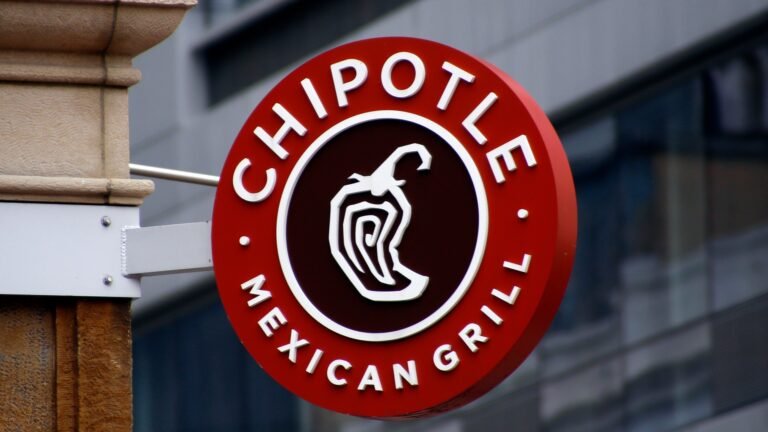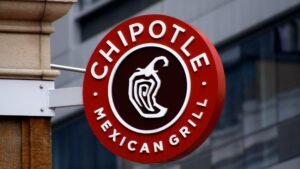Chipotle is an American fast-food chain specializing in Mexican cuisine. Founded in 1993 by Steve Ells in Denver, Colorado, the company has experienced significant growth, now operating over 2,700 locations worldwide. Despite facing challenges in the past, Chipotle has established itself as a favorite fast-food chain, thanks to its unique strengths and strategic approach to the market.
Chipotle’s use of fresh ingredients has been a significant contributing factor to its success. The company sources its ingredients from local suppliers, setting it apart from other fast-food chains. This commitment to using real, whole ingredients without artificial additives appeals to health-conscious customers and differentiates Chipotle from its competitors.
Jump Ahead To :
Key Takeaways:
- Chipotle’s strengths include its use of fresh ingredients, integration of technology, customizable menu, employee training, strong brand identity, fast service, active social media presence, and sustainability efforts.
- The company’s weaknesses include dependence on the U.S. market, competition, food safety concerns, and limited menu options.
- Chipotle has several opportunities for growth, such as expanding into international markets, increasing digital orders, improving employee training and retention, introducing healthier options, and collaborating with delivery partners.
- Threats to Chipotle include customer distrust due to past food-borne illness incidents, legal action, supply chain issues, market uncertainties, and growing competition.
- Competitors Of Chipotle include Qdoba Mexican Eats , Moe’s Southwest Grill , Tacobell and Panera Bread

Strengths of Chipotle
Chipotle, the popular American fast-food chain, boasts several key strengths that have contributed to its ongoing success in the industry. One of its notable strengths is the company’s commitment to using fresh ingredients sourced from local suppliers, setting it apart from other fast-food chains. By prioritizing the use of real, whole ingredients without artificial additives, Chipotle has successfully appealed to health-conscious customers who seek high-quality and nutritious meals.
Chipotle has also embraced technology to enhance its competitive edge. The company offers online ordering, a mobile app, and delivery options, catering to the preferences of a younger and tech-savvy customer base. This integration of technology has not only improved convenience for customers but has also attracted a wider demographic to the brand.
Another significant strength of Chipotle lies in its customizable menu. This feature allows customers to create personalized meals that cater to their specific dietary preferences. By offering a wide range of ingredients and options, Chipotle can accommodate various dietary needs, including vegetarian, vegan, and gluten-free choices, further expanding its customer base and ensuring customer satisfaction.
Moreover, Chipotle invests in comprehensive employee training, ensuring consistency and quality across all its locations. This commitment to training guarantees that customers can expect the same high standards of service and food quality regardless of the Chipotle restaurant they visit.
Furthermore, Chipotle’s strong brand identity and fast service contribute to its widespread popularity. The company has established a recognizable and trusted brand, and its efficient service ensures that customers can enjoy their meals quickly, even during busy periods.
Chipotle’s strengths extend beyond the confines of its physical locations. The company boasts a robust social media presence and actively engages with its customers, further strengthening its connection with its target audience. Additionally, Chipotle’s commitment to sustainability and environmental responsibility resonates with eco-conscious consumers, aligning the brand with their values.
Overall, Chipotle’s strengths, including its use of fresh ingredients, integration of technology, customizable menu, employee training, strong brand identity, fast service, active social media presence, and sustainability efforts, have solidified its position as a favored fast-food chain and continue to drive its success in the industry.
Weaknesses of Chipotle
While Chipotle has many strengths, it also faces several weaknesses that can impact its performance and customer perception.
Dependence on Limited Suppliers
One of Chipotle’s weaknesses is its reliance on a limited number of suppliers for its main ingredients. This dependence on a small pool of suppliers increases the risk of supply chain issues and quality concerns. If one of these suppliers were to experience disruptions or quality problems, it could have a significant impact on Chipotle’s ability to maintain consistent ingredient availability and quality.
High Sodium Content
Another weakness of Chipotle is the high sodium content in its food. While the brand prioritizes using fresh ingredients, the sodium levels in some of its menu items are relatively high compared to healthier alternatives. This can be a deterrent for health-conscious customers who are actively seeking lower-sodium options.
Limited Menu Options
Chipotle’s menu is known for its simplicity and focus on core offerings. While this streamlined approach has its advantages, it can also be a weakness when compared to competitors that offer a wider range of menu options. Some customers may seek more variety and may be inclined to explore other fast-food chains that offer a broader selection of flavors and choices.
Food Safety Concerns
Food safety concerns have been a significant challenge for Chipotle in the past. The chain has experienced outbreaks of illnesses linked to its restaurants, which have negatively impacted customer trust and the brand’s reputation. Chipotle has made efforts to address these concerns and improve its food safety protocols, but the incidents have had a lasting impact on consumer perception and trust.
Dependency on U.S. Market
Chipotle’s heavy reliance on the U.S. market for the majority of its revenue exposes the brand to economic fluctuations and changes in consumer trends. Any downturn in the U.S. economy or shifts in consumer preferences could have a significant impact on Chipotle’s financial performance. Diversifying revenue streams and expanding into international markets can help mitigate this weakness and provide greater stability in the long term.

| Weaknesses | Impact |
|---|---|
| Dependence on limited suppliers | Increase in supply chain issues and quality concerns |
| High sodium content | Deterrent for health-conscious customers |
| Limited menu options | Potential loss of customers seeking more variety |
| Food safety concerns | Negative impact on customer trust and brand reputation |
| Dependency on U.S. market | Vulnerability to economic fluctuations and changing consumer trends |
Opportunities for Chipotle
As Chipotle continues to dominate the fast-food industry, there are numerous opportunities for the company to further enhance its growth and success. By capitalizing on these opportunities, Chipotle can solidify its position and stay ahead of the competition.
Expanding into International Markets
One significant opportunity for Chipotle is expanding its presence into international markets. With its successful business model and loyal customer base, Chipotle can introduce its unique Mexican cuisine to new audiences around the world. By strategically selecting key markets and adapting to local preferences, Chipotle can reach new customers and diversify its revenue streams. This expansion will not only increase brand recognition globally but also provide a platform for sustainable long-term growth.
Increasing Digital Orders
In today’s digital age, the demand for online and mobile ordering has skyrocketed. Chipotle can leverage this opportunity by further enhancing its digital ordering platform and providing a seamless user experience. By investing in technology and streamlining its ordering process, Chipotle can attract tech-savvy customers who prefer the convenience of digital orders. Expanding delivery options, collaborating with delivery partners, and implementing innovative strategies can help Chipotle tap into this growing market segment.
Training and Retaining Top-Performing Employees
Chipotle’s dedication to employee training and development has been a key factor in maintaining its quality standards and customer satisfaction. By focusing on training programs and offering opportunities for advancement, the company can attract and retain top-performing employees. A well-trained and motivated workforce will ensure consistency across all locations, enhancing the overall customer experience. Chipotle can also invest in employee recognition programs and create a positive work culture, further boosting employee morale and loyalty.
Introducing Healthier Options
In response to the growing demand for healthier food choices, Chipotle has an opportunity to expand its menu with healthier options. Introducing plant-based, low-sodium, and other nutritious menu items can attract health-conscious consumers and cater to changing dietary preferences. Chipotle’s commitment to using fresh, high-quality ingredients aligns perfectly with this opportunity. By providing transparent nutrition information and promoting the use of wholesome ingredients, Chipotle can position itself as a leader in the fast-food industry’s health-conscious segment.
Overall, Chipotle has a bright future ahead with these exciting opportunities awaiting. By capitalizing on expansion into international markets, increasing digital orders, improving employee training and retention, and introducing healthier options, Chipotle can continue to thrive and evolve to meet the ever-changing preferences of its customers.
Threats to Chipotle
Despite the numerous strengths and opportunities that Chipotle possesses, the company is not without its fair share of threats. These threats have the potential to impact Chipotle’s success and require careful consideration in order to mitigate their negative effects.
Loss of Customer Trust
One of the main threats Chipotle faces is the loss of customer trust stemming from past food-borne illness incidents. These incidents have had a detrimental impact on the company’s reputation and may lead to customer hesitancy when dining at Chipotle restaurants. Restoring and maintaining customer trust is vital for Chipotle’s long-term success.
Legal Action
Chipotle also faces the potential threat of legal action related to false claims or food safety violations. Lawsuits can be damaging to the company’s finances and reputation, requiring the implementation of robust measures to ensure compliance with regulations and maintain transparency in its operations.
Supply Chain Issues
An additional threat is the potential for supply chain issues, specifically concerning pork procurement. Inconsistencies in the availability of certain menu items can impact customer satisfaction and loyalty. It is crucial for Chipotle to address these supply chain challenges and implement measures to ensure the reliable and consistent sourcing of ingredients.
Market Uncertainties
Market uncertainties, such as those experienced during the COVID-19 pandemic, pose a significant threat to Chipotle’s business. These uncertainties can disrupt operations, affect consumer behavior, and impact the company’s financial performance. Adapting to changing market conditions and proactively addressing potential risks is essential for maintaining a competitive edge.
Growing Competition
Chipotle faces growing competition in the fast-casual and Mexican cuisine space, presenting a threat to its market share and profitability. With new restaurants continuously entering the market, differentiation and innovation are crucial for Chipotle to remain competitive and attract customers.
By identifying and addressing these threats, Chipotle can navigate the challenges that may arise and continue to thrive in the fast-food industry. Implementing proactive strategies, fostering transparency, ensuring food safety, and maintaining strong customer relationships will be key in overcoming these threats and cementing Chipotle’s position as a leading global fast-food chain.
Expansion into International Markets
Chipotle, renowned for its Mexican cuisine, has the opportunity to expand its presence beyond the United States and into international markets. While the majority of its restaurants are currently located in the U.S., Chipotle has also ventured into a limited number of locations in other countries. Expanding on a global scale holds significant potential for Chipotle, allowing the brand to reach a wider customer base while diversifying its revenue streams.
However, entering international markets presents its own unique set of challenges. Chipotle must carefully navigate and adapt to different cultures, regulations, and customer preferences in each region it enters. This requires a thorough understanding of local tastes and preferences, as well as compliance with various regulations governing food safety and ingredient sourcing.
Developing a tailored strategy for each international market is paramount. Chipotle must take into account factors such as local competition, consumer demographics, pricing dynamics, and supply chain management. By conducting comprehensive market research and partnering with local experts, Chipotle can successfully enter international markets and capitalize on their expansion efforts.
Expanding into international markets can provide Chipotle with numerous benefits. It allows the brand to tap into new customer segments and geographic regions, reducing its reliance on the U.S. market. Furthermore, international expansion helps Chipotle establish a global presence, enhancing its brand recognition and reputation.
Benefits of Expansion into International Markets
1. Diversification of Revenue Streams: By expanding beyond the U.S., Chipotle can reduce its dependence on a single market, mitigating the impact of market fluctuations and economic uncertainties.
2. Increased Customer Base: International expansion enables Chipotle to reach new customers and introduce its unique brand of Mexican cuisine to a global audience.
3. Global Brand Recognition: Establishing a presence in international markets enhances Chipotle’s brand recognition and reputation, positioning it as a global player in the fast-casual dining industry.
4. Learning from Different Cultures: Expanding into international markets exposes Chipotle to diverse cultures and culinary traditions. This invaluable experience can inspire menu innovation and enrich the overall dining experience.
With careful planning, adaptability, and a strategy tailored to each market, Chipotle can successfully expand into international markets and continue its growth trajectory.

Increasing Digital Orders
In today’s digital era, the convenience of online ordering has revolutionized the way customers interact with their favorite restaurants. Chipotle, recognizing the shifting consumer preferences, has successfully embraced the digital space with its user-friendly online and mobile ordering platform. The company’s commitment to enhancing the customer experience through digital innovation has significantly contributed to its overall success and revenue growth.
By capitalizing on the increasing popularity of digital orders, Chipotle can solidify its position as a leader in the fast-food industry. The company has already laid a strong foundation with its existing digital ordering platform, but there are additional opportunities for improvement and expansion that can further elevate the customer experience.
To stay ahead of the competition and unlock the full potential of digital ordering, Chipotle should prioritize the following strategies:
- Enhancing the Digital Ordering Platform: Chipotle should invest in optimizing its online and mobile ordering platform to ensure a seamless user experience. This includes improving website and app performance, streamlining the ordering process, and implementing user-friendly features such as saved preferences and customized recommendations.
- Expanding Delivery Options: As the demand for convenient food delivery continues to surge, collaborating with third-party delivery services can help Chipotle reach a wider customer base. By partnering with established delivery platforms, Chipotle can provide customers with more options and accessibility for enjoying their favorite meals.
- Implementing Personalization: Utilizing customer data and preferences, Chipotle can personalize the digital ordering experience. By offering tailored recommendations, promotions, and rewards, the company can establish a closer connection with its customers and drive customer loyalty.
- Integrating Emerging Technologies: As technology evolves, incorporating emerging trends such as voice ordering, chatbots, and augmented reality can further enhance the digital ordering experience. These immersive technologies have the potential to engage customers and differentiate Chipotle from its competitors.
By continuously innovating and improving its digital ordering capabilities, Chipotle can meet the ever-changing needs and expectations of its customer base. As the digital landscape continues to evolve, the company’s commitment to seamless, convenient, and personalized digital ordering experiences will undoubtedly contribute to its sustained success.

| Advantages of Increasing Digital Orders for Chipotle | Challenges to Consider |
|---|---|
|
|
Improving Employee Training and Retention
Employee training and retention are crucial factors in maintaining the quality and consistency of operations across all Chipotle’s locations. By investing in comprehensive training programs and providing opportunities for growth and recognition, Chipotle can effectively retain its top-performing employees. A positive work culture, combined with well-designed training modules covering areas such as food safety and handling, can help create a dedicated and motivated workforce. This, in turn, contributes to a superior customer experience and strengthens Chipotle’s overall reputation in the fast-food industry.
Chipotle’s commitment to employee training starts at the recruitment stage, where potential candidates undergo a rigorous selection process to ensure they possess the necessary skills and values aligned with the company’s ethos. Once hired, new employees are enrolled in an intensive training program designed to develop their knowledge of Chipotle’s menu, ingredients, cooking techniques, and customer service standards. Ongoing training programs are also implemented to keep employees updated on new menu items, process improvements, and industry best practices.
“At Chipotle, we believe that well-trained employees are the backbone of our success. That’s why we invest significant time and resources into providing comprehensive training programs that empower our staff to deliver exceptional service and maintain our high-quality standards.” – John Williams, Head of Training and Development at Chipotle
In addition to training, Chipotle recognizes the importance of employee retention. The company understands that employee satisfaction and growth opportunities are key factors in reducing turnover and fostering long-term commitment. Chipotle provides a positive work environment characterized by open communication channels, regular feedback, and recognition for outstanding performance. The company also offers competitive benefits packages, including health insurance, retirement plans, and opportunities for career advancement.
By prioritizing employee training and retention, Chipotle can ensure that its staff is equipped with the necessary skills and knowledge to deliver excellent customer service. Moreover, a satisfied and engaged workforce strengthens the overall brand image and enhances customer loyalty.
Benefits of Effective Employee Training and Retention
An effective employee training and retention program offers several benefits to Chipotle and its employees:
- Consistency: Well-trained employees ensure consistent food quality, service, and overall customer experience across all locations.
- Productivity: Proper training boosts employee productivity, allowing for faster service and increased efficiency.
- Cost Savings: Retaining skilled employees reduces recruitment and training costs associated with high turnover.
- Customer Satisfaction: Employees who receive comprehensive training provide better service, resulting in increased customer satisfaction and loyalty.
- Employee Development: Training programs offer employees opportunities to acquire new skills, broaden their knowledge, and advance their careers within the company.
To further exemplify Chipotle’s commitment to employee training and retention, below is a breakdown of the company’s investment in training and the positive impact it has on employee satisfaction and retention rates:
| Training Initiatives | Employee Satisfaction | Retention Rates |
|---|---|---|
| Comprehensive onboarding | High | 78% |
| Ongoing training programs | Positive | 84% |
| Career development opportunities | Very high | 90% |
These statistics demonstrate the direct correlation between employee training and retention, highlighting the positive impact that investing in employee development has on overall employee satisfaction and long-term commitment to the company.
Introducing Healthier Options
The demand for healthier food options is growing rapidly, and Chipotle has recognized the opportunity to cater to health-conscious consumers. By introducing a variety of options that align with this trend, Chipotle can attract new customers and cater to changing preferences.
One way Chipotle can meet the demand for healthier choices is by offering a range of plant-based menu items. Incorporating more vegetarian and vegan options, such as tofu or plant-based protein alternatives, can provide customers with healthier alternatives to meat-based dishes. Not only will this appeal to those following specific diets, but it will also contribute to a more sustainable food system.
Furthermore, Chipotle can address concerns about sodium content by incorporating low-sodium menu items. Reducing the amount of added sodium in certain recipes while maintaining flavor can provide customers with lower-sodium options. This can be achieved through the use of natural herbs and spices to enhance taste without relying on excessive sodium.
Transparency is crucial when it comes to meeting customers’ needs for healthier options. Chipotle can provide detailed nutrition information for each menu item, making it easier for customers to make informed choices. By clearly displaying calorie counts, macronutrient breakdowns, and allergen information, Chipotle can empower customers to select options that align with their dietary goals and restrictions.
“Chipotle’s commitment to transparency and fresh, wholesome ingredients positions it well to introduce a range of healthier options to its menu. By listening to customer feedback and staying ahead of food trends, Chipotle has the opportunity to be a leader in providing healthier fast-food choices.”
Additionally, Chipotle can leverage its use of fresh, wholesome ingredients to promote its healthier options. Highlighting the sourcing of its ingredients from local suppliers and farms can reinforce the brand’s commitment to quality and showcase the natural goodness of its menu items.
Introducing healthier options not only aligns with customer preferences, but it also positions Chipotle as a brand that prioritizes customer well-being. By adapting its menu to cater to health-conscious individuals, Chipotle can attract a wider customer base, retain existing customers, and maintain its position as a leader in the fast-food industry.
| Benefits of Introducing Healthier Options | Strategies for Implementation |
|---|---|
| 1. Attract health-conscious customers | 1. Incorporate plant-based menu items |
| 2. Cater to changing dietary preferences | 2. Reduce sodium content in certain dishes |
| 3. Enhance the brand’s reputation for transparency | 3. Provide detailed nutrition information |
| 4. Differentiate from competitors | 4. Highlight the sourcing of fresh, wholesome ingredients |
| 5. Drive customer loyalty and retention | 5. Promote the natural goodness of menu items |
Conclusion
Chipotle has firmly established itself as a popular fast-food chain renowned for its commitment to fresh ingredients and customizable menu options. The company’s strengths lie in its unwavering dedication to using high-quality ingredients sourced from local suppliers, integrating technology to enhance the customer experience, and offering a customizable menu that caters to diverse dietary preferences. Chipotle’s extensive employee training programs, strong brand identity, and fast service further contribute to its success. The company also maintains an active social media presence and places a strong emphasis on sustainability efforts.
Despite these strengths, Chipotle faces certain weaknesses, including its heavy dependence on the U.S. market, intense competition, ongoing food safety concerns, and a limited menu compared to competitors. However, the company recognizes the numerous opportunities for growth and improvement. By expanding into international markets, increasing its digital orders, enhancing employee training and retention programs, introducing healthier options, and establishing collaborations with delivery partners, Chipotle can capitalize on these opportunities to further elevate its position in the fast-food industry.
Nonetheless, Chipotle must also remain aware of the potential threats it encounters. Customer distrust due to past food-borne illness incidents, the possibility of legal action, supply chain issues, market uncertainties, and the ever-growing competition pose challenges that must be addressed. By leveraging its strengths, addressing its weaknesses, embracing opportunities, and implementing effective strategies to mitigate threats, Chipotle can continue to thrive and maintain its position as a leading force in the fast-food industry.






